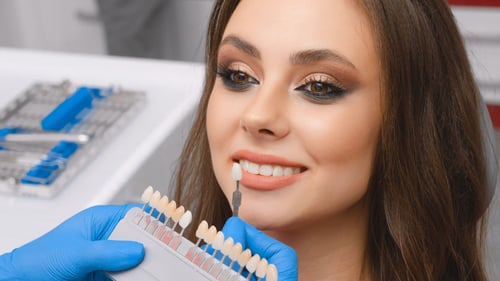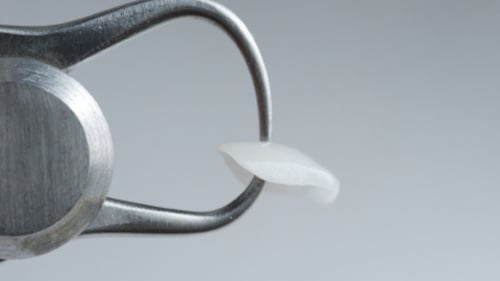Porcelain Veneers 101
What are porcelain veneers?

Porcelain veneers are thin, custom-made shells designed to improve the appearance of your smile by covering the front surface of your teeth. Crafted from durable ceramic material, these veneers are bonded to the natural tooth enamel, providing a resilient and attractive solution for numerous dental issues.
Porcelain veneers are now widely embraced for their ability to address issues such as discoloration, chipping, or misalignment, offering a minimally invasive alternative to more extensive dental procedures. With advancements in technology and the increasing demand for cosmetic dentistry, porcelain veneers have gained immense popularity, favored for their natural look and long-lasting results.
Porcelain veneers not only transform smiles but also contribute to the overall confidence and self-esteem of individuals seeking a radiant smile.

Porcelain Veneers Cost
Due to a meticulous crafting process and the high quality of material, porcelain veneers are generally more expensive than alternative options, with an average cost ranging from $1,200 to $2,500 per tooth. A full set of porcelain veneers can cost upwards of $20,000. Additionally, factors such as geographic location and the reputation of your dentist can affect the overall costs.

Porcelain Veneers Procedure & Timeline
The process of porcelain veneers involves several simple steps. You will attend an initial consultation, where you and the dentist will discuss your cosmetic goals and develop a personalized plan for your treatment.
In a second appointment, the dentist will prepare your teeth by removing a small amount of enamel, take impressions, and provide you with temporary veneers. Prior to your third appointment, the dentist will send your impressions to a specialized dental lab, where expert technicians will fabricate your permanent veneers, a process that takes 2-3 weeks to complete.
During your third appointment, the dentist will bond the porcelain veneers to your teeth using a dental adhesive and UV light. This process should take no longer than an hour. Overall, the process for getting your porcelain veneers is straightforward, and you’ll see life-changing results in relatively little time. For additional information, see here.
Potential Risks of Porcelain Veneers
Porcelain veneers are a minimally invasive option for enhancing your smile. However, like any dental procedure, getting porcelain veneers carries a few potential risks. The procedure involves non-reversible enamel removal, permanently changing your natural tooth structure. As a result, you may experience tooth sensitivity, and your teeth may be more vulnerable to temperature changes.
Additionally, although porcelain veneers have demonstrated remarkable durability, cracks or breakages can occur, particularly if you engage in activities or habits such as contact sports, teeth grinding, or biting on hard objects. Being mindful of habits that could potentially damage your veneers is vital to ensuring their longevity.
Ultimately, getting porcelain veneers presents minimal risk. If you have specific concerns about your health and safety at any point in the process, be sure to clearly communicate these concerns with your dentist. Additionally, after your permanent veneers have been applied, make sure you contact your dentist immediately if you experience any chipping, cracking, or other damage to your porcelain veneers.
FAQs
Porcelain veneers may not be suitable for everyone. Candidates should have healthy teeth and gums and minimal existing dental work. Individuals with extensive dental issues may require alternative treatments. Consulting with a dentist is critical to determine suitability based on your oral health and cosmetic goals.
Porcelain veneers can address various dental issues, including discolored or stained teeth, gaps between teeth, misaligned or uneven teeth, and minor chips or cracks. They provide a versatile cosmetic solution to enhance the appearance of your teeth by covering imperfections and creating a natural-looking smile.
- Cost: Composite resin veneers are generally more affordable, typically ranging from $250 to $1,500 per tooth.
- Longevity: Porcelain veneers have a lifespan of 10-15 years or longer, surpassing the 5-7 years expected from composite resin veneers.
- Aesthetics: Porcelain veneers excel in providing a natural aesthetic, while composite resin veneers may be more susceptible to staining over time.
Porcelain veneers require similar care to natural teeth–regular brushing, flossing, and dental check-ups are essential. While natural teeth can develop cavities, veneers are resistant, but the underlying teeth must still be protected.
The recovery time after getting porcelain veneers is minimal. You may typically resume normal activities immediately after the procedure and may experience only mild discomfort or sensitivity that should subside within a few days. You might go through an adjustment period as you adapt to the new veneers, but this is usually brief. Your dentist may provide you with post-procedure care instructions, advising you to temporarily avoid certain foods or habits.
Yes, your dentist can customize porcelain veneers to match the color of your natural teeth. During a consultation, your dentist will assess your natural tooth shade and collaborate with you to choose a suitable color for the veneers. Advanced dental technology allows for precise color matching, ensuring a natural appearance. Communicate your preferences and expectations with your dentist to achieve the desired outcome.
Porcelain veneers typically last 10 to 15 years, although their lifespan can vary based on individual oral hygiene practices, lifestyle factors, and overall dental health. Regular dental check-ups and proper care can contribute to their longevity.
Yes, you can find cheaper alternatives to porcelain veneers that cater to different needs. Composite resin veneers are a budget-friendly option that can improve the appearance of your teeth, although they may not last as long as porcelain veneers. Teeth whitening procedures are another alternative, addressing discoloration without altering the tooth structure, but they do not correct other imperfections.
You should note that although these alternatives can save you money in the short-term, porcelain veneers stand out as a more versatile and durable option. Porcelain veneers exhibit superior resistance to staining and chipping and provide a longer-lasting aesthetic improvement.
Porcelain veneers should be considered permanent. The process involves removing a thin layer of enamel from the teeth to make room for the veneers. While veneers can be replaced, the original tooth structure cannot be fully restored.
Yes, you can eat and drink normally with porcelain veneers. However, you should avoid biting on hard objects, such as ice or pens, to prevent potential damage. Additionally, while porcelain veneers are stain-resistant, you may want to limit your consumption of food and drinks like coffee or red wine to maintain their aesthetic appearance.
The preparation of porcelain veneers typically takes 2-3 weeks. After the dentist assesses the patient's teeth, takes impressions, and prepares the teeth, the impressions are sent to a dental laboratory where the custom veneers are fabricated. Once the permanent veneers are ready, you will return for the bonding procedure, which usually takes one to two hours.
If you experience a porcelain veneer emergency like a chip or crack, contact your dentist immediately. Avoid chewing on hard substances and keep the area clean. Your dentist will assess the damage and recommend appropriate solutions, which may include repairing or replacing the veneer.
Porcelain veneers typically do not generally affect speech or the way your bite feels when properly fitted by a skilled dentist. In some cases, you may need minor adjustments as you adapt to your veneers. Make sure to communicate any concerns with your dentist to guarantee proper placement and comfort.
Consider your dentist’s experience with cosmetic dentistry, specifically veneer placement. Look for before-and-after photos of previous cases and check patient reviews for satisfaction. Schedule a consultation to discuss your goals, evaluate their communication style, and clarify costs. Ultimately, choose a dentist who listens to your concerns and has a proven track record in delivering quality veneer results.
Embark on the next phase of your smile journey by completing our online form to schedule an in-person consultation. Our dedicated team of experts is eager to discuss your unique needs, answer any questions, and tailor a personalized porcelain veneer treatment plan that aligns with your needs. We invite you to take the first step toward lasting confidence today.
Contributors:
.jpg?width=50&height=50&name=iVeneers%20-%20Profile%20(1).jpg)
Dr. Omid Farahmand
DMD, Dentistry

Astrid Chang
Research Specialist
References:
- Joana Godinho, Roger Peres Gonçalves, and Luis Jardim, “Contribution of facial components to the attractiveness of the smiling face in male and female patients: A cross-sectional correlation study,” American Journal of Orthodontics and Dentofacial Orthopedics 157, no. 1 (2020): 98-104. https://doi.org/10.1016/j.ajodo.2019.01.022.
- Jessica Schrader, “There’s Magic in Your Smile,” Psychology Today (blog), June 25, 2012, https://www.psychologytoday.com/intl/blog/cutting-edge-leadership/201206/there-s-magic-in-your-smile.
- Gresnigt, Marco et al, “Randomized clinical trial on indirect resin composite and ceramic laminate veneers: Up to 10-year findings,” Journal of Dentistry 186, no. 1 (2019): 102-109. https://doi.org/10.1016/j.jdent.2019.06.001.
- Jurado, Carlos et al, “A Conservative Approach to Ceramic Veneers: A Case Report,” Operative Dentistry 45, no. 3 (2020): 229-234. https://doi.org/10.2341/19-051-T.
From Our Blog

Why College Students Choose Porcelain Veneers in Los Angeles

Porcelain Veneers in Los Angeles: The Perfect Wedding Smile







